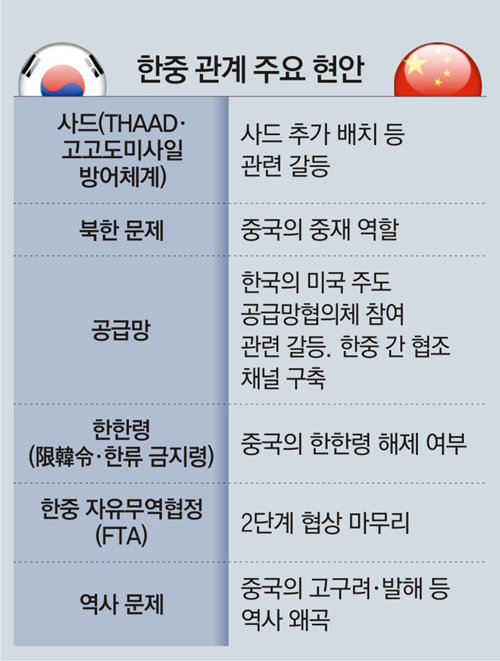Korea and China to begin 1.5-track dialogue in next spring
Korea and China to begin 1.5-track dialogue in next spring
Posted November. 25, 2022 07:42,
Updated November. 25, 2022 07:42

South Korea and China have allegedly agreed to begin the ‘1.5-track’ dialogue centering on economy and trade before spring next year at the latest and are having detailed discussions. The two nations also decided to launch a high-level economic cooperation body on which the discussions are already underway. Amid its recent all-out efforts for an economic rebound, the government reportedly concluded that enhancing the relations with China, the country’s biggest export market, is key to revitalizing the economy. Cooperation with China has become ever more important for the Korean government to rein in North Korea, which is about to undergo its seventh nuclear test. With President Xi Jinping having secured his third term as the Chinese leader, some say that China would need Korea as an ally to keep it from leaning heavily toward the U.S. This naturally opens up a chance for the two countries to broaden the scope of exchanges.
Piecing together The Dong-A Ilbo’s coverage on Thursday, South Korea and China are recently having an active discourse to operate various channels for consultation. Among them is the 1.5 track, a semi-governmental dialogue body involving public officials and private experts. During the Korea-China Summit held in Bali, Indonesia on Nov. 15, President Xi proposed a 1.5-track dialogue between the two nations to President Yoon Suk-yeol.
“The two sides have agreed to start the (1.5-track) dialogue no later than next spring and are discussing it (with China),” a high-ranking South Korean government official said in a telephone interview with The Dong-a Ilbo. Marking the 30th anniversary of diplomatic relations, Korea and China had operated a 1.5-track consultative body, the Committee for Future-Oriented Development of Korea-China Relations, for a year since August last year to present ideas on future relations between the two countries. The body, where 44 people in total, 22 from each country, participated as members, also released a report on policy recommendations by sector.
The 1.5-track system, expected to begin early next year, is said to be more densely constructed than the body that ended this year. A government official noted that the dialogue would play an important role in sketching what the two governments will do for each key challenge and how they will discuss each issue going forward. It is reported that the two countries have begun working-level discussions on the 1.5-track dialogue even before the summit this month and have recently made some progress in the discussions on how the dialogue will be formed and organized.
The government is also known to have begun working-level meetings with China to regularly operate high-level economic consultative bodies through diplomatic and trade channels. The discussions will include explorations on stabilizing trade and supply chains between the two countries.
Immediately after its launch, the Yoon Suk-yeol administration put strengthening its alliance with the U.S. as its top priority. "Korea's joining in the IPEF shows its intention to move toward the strategy of ‘depending on the U.S. for security and the world for the economy instead of its previous stance to ‘depend on the U.S. for security and China for the economy,” a Seoul official said about his participation in the U.S.-led Indo-Pacific Economic Framework (IPEF) in May, which aimed at holding China in check. Since then, cooperation between South Korea, the U.S., and Japan has been enhanced, but some have pointed out that the relations between South Korea and China have become rather strained.
However, the government's recent stance toward China shows otherwise. Compared to the early phase of his term, President Yoon is putting extra effort into China. "The relationship between Korea and China has entered an inflection point," the official said. "Now we are resetting the direction of Korea-China relations to move closer toward China."
Meanwhile, attention is also being paid to whether “China’s ban on the Korean Wave,” one of the biggest pending issues between the two sides, will be lifted. China recently has offered Korean movies on its OTT service six years after the ban was imposed. "After the Korea-China summit, China responded by streaming Korean entertainment content through its OTT service," the presidential office explained. The Ministry of Foreign Affairs of China said in a briefing on Wednesday that it would like to reiterate that the Chinese government has never enacted a boycott on Korean pop culture, adding that China remains open to cultural exchanges with Korea. Some say that China’s recent measure to provide Korean content through its OTT channel may be a signal of its intention to lift the ban.
Jin-Woo Shin niceshin@donga.com







